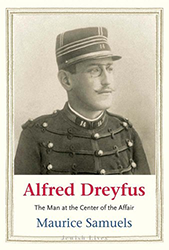History remembers Captain Alfred Dreyfus as a victim of French anti-Semitism who was convicted of espionage he did not commit, and exonerated thanks to the passionate support of the novelist Emile Zola. Louis Begley insists that the lessons of the Dreyfus Affair, beyond the particulars of the historical episode, extend to abuses of power and anti-Jewish behavior at large today.
In the spare language of his novels, Begley builds a devastating case against the conspirators who knowingly perverted the justice system as they made Dreyfus a scapegoat. Then he goes on to draw a straight line from the anti-Semitism of the Catholic Church and the French military in the 1890’s down to the present.
The French Jews, he writes, nonetheless had a “tendency to minimize the importance of anti-Semitism, remain passive, and avoid speaking out against outrageous behavior. …Emancipated Jews had fallen in love with the good news that they could be like other people, [but] ‘other people’ did not want Jews to be like them. They wanted Jews out of the way.”
Begley, writing in 2008, was struck by the parallels between the standard operating procedures for the Guantánamo prison camp and the instructions for the administration of Devil’s Island, where Dreyfus suffered solitary confinement under horrible conditions for some four years. He asks whether each succeeding generation will have its own Zolas, “ready to defend human rights…against abuse wrapped in claims of expediency and reasons of state.” Begley’s riveting details and unremitting passion make this book a worthy successor to J’accuse. Cast of characters, chronology, index, notes.
Bob Goldfarb is President Emeritus of Jewish Creativity International.





